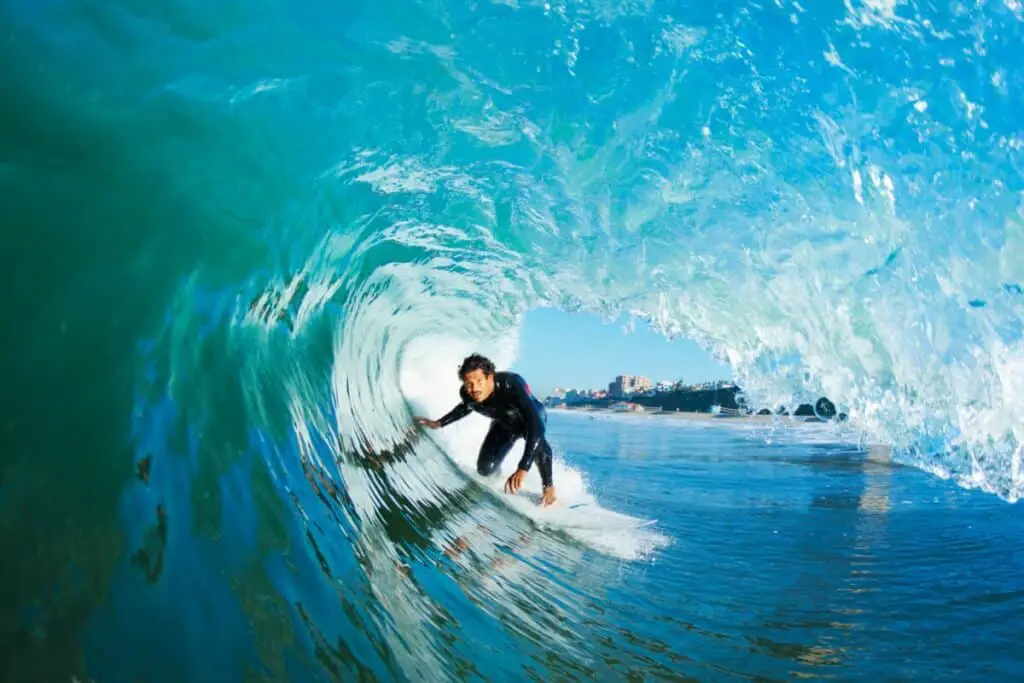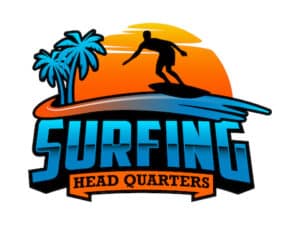
The ocean holds many fun activities for those brave enough to venture into it. One such activity is the exciting and popular sport of surfing. However, can you learn how to surf in one lesson?
It is possible to learn how to surf in the one-hour lesson. However, most people will not be able to go beyond simply catching a wave and riding the surfboard in a straight line without changing direction. It takes several months to grasp the basics of surfing fully.
Surfing is a relatively simple sport in concept. But it is in no way considered easy in practice. Here are some basics to know before you hit the waves.
Do I Need to Know How to Swim for Surfing Lessons?
You need to know some basic swimming skills to surf safely and properly.
You can argue that your surfboard is always attached to you, but the problem of not knowing how to swim does not just affect your ability to stay afloat. Surfing requires you to paddle along the surface of the water. Paddling is a skill that is similar to swimming. If you do not know how to paddle, you will not be able to surf properly. On rare occasions, the leg rope may snap, and you can lose your board.
Some surf schools will only teach people who know how to swim 50 metres for safety reasons.
The other issue is a bit more serious. Surfing is not a sport done in waist-deep water. You need to go out a bit into the ocean to get some good waves. If you cannot swim and lose your board, then you cannot recover and safely get back to shore.
Beginner surfers may have considered wearing a life vest, but it’s very rare for a surfer to wear a life vest. Surfers do not wear a life vest because paddling is not easy with the life jacket, and you cannot duck dive your board as you float too much. The only exception would be big wave surfing (15-20+ ft), where people wear specially designed life vest for the task.
The ocean can be an extremely dangerous body of water. Getting into it without knowing how to swim is a bad idea. If you wish to surf and do not know how to swim, you should attend swimming lessons before attending surfing lessons. You do not need to be a graceful swimmer, but you need to know the basics.
How Do I Prepare for Surfing Lessons?

To prepare for surfing lessons, you must first be comfortable in the water.
The ocean is very different from your backyard pool. It is not as clear and takes more control and strength to keep your head above the waves. One of the main obstacles to surfing is a fear of the ocean. You are already doomed to fail if you are not confident in the water. Practice holding your breath and swimming to help gain confidence and skill in the water to prepare for your surfing lessons.
Second, surfing is a sport that requires a lot of physical activity. You need strength, balance, power, endurance, and flexibility. As such, you need to be in good physical condition before you should attempt to surf. You do not want to be out in the ocean having lost your board, treading water, and realize that you are too tired to swim back to shore.
Some tools and exercises can help improve your balance (such as a balance disk or balance board) or perform balancing exercises. There are also surf-specific strength exercises you can do to help strengthen the muscles needed to get up on the board and paddle.
Third, you will need the proper equipment. Some surfing lessons provide surfboards for use. Others require you to bring your board. Along with a surfboard, a proper swimsuit is required. You will likely experience a wardrobe malfunction if you wear a regular swimsuit. During the summer, males wear boardshorts and rashguards, whereas females wear boardshorts or two-piece swimmers. To make surfing easier, specific swimsuits and wetsuits are available for surfing to provide greater flexibility.
Ensure you are hydrated and have eaten a decent meal before and after your lesson. Have sun protection through water-resistant sunscreen and maybe even wear a surf hat to prevent major sunburns.
What Should I Expect in Surfing Lessons?
Surfing lessons consist of three main parts.
The first starts with just adjusting to laying and balancing on the board. This allows you to find the balance on your board and learn to move around without falling into the water. It depends on how choppy the surface of the water is; it can take you as little as thirty minutes or several hours to get the hang of this.
Once you get that down, you paddle and try to catch the waves. Paddling is something you can master over the years. However, most people can paddle enough to catch a small or broken wave on a longboard or foam board.
Finally comes the hardest part of surfing. Standing on your board and balancing. This step involves jumping onto your feet when a wave pushes you and remaining standing while riding a wave. You may ride the wave to the shore or get slammed off the board by waves, falling off because of a misbalance, and then retrieve your board and do it again. You will get knocked off the board a lot at the beginning. It can be disheartening to many beginners. But even professional surfers can wipe out, so don’t give up. Persevere, and it will soon be like riding a bike.
How Many Surfing Lessons Do I Need?

Surfing is just like any other skill we learn. The easiest and quickest way to learn is to practice. The more waves you catch, the better you will become at surfing.
It is recommended you have three to four lessons to at least get the basic movements down before you get into the water by yourself.
However, lessons can only contribute so much. Your skill in surfing ultimately comes down to your physical level and how much practice time you get on the waves. Instructors generally notice that people who hit the waves four times a week learn faster than those who book weekend lessons.
You do not want to wear yourself out on the waves. Pay attention to what your body tells you and your daily energy levels. Space out your practice time between separate days as you adjust to the physical fatigue that comes with surfing. Surfing is about overcoming obstacles, no matter how long it might take. It is not a sprint to the finish line.
Most importantly, have fun on the waves! Surfing is all about having a blast with your friends and family. So, laugh when you inevitably fall. Cheer when you catch a wave. Clap for your fellow surfers when they succeed, even if you fail. Surfing is a personal journey that only you can define.

